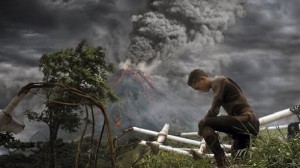
This film publicity image released by Sony – Columbia Pictures shows Jaden Smith in a scene from “After Earth.” AP/Sony, Columbia Pictures
LOS ANGELES — Humanity’s home planet hardly merits the name-check in “After Earth,” M. Night Shyamalan’s sci-fi survival tale whose shipwreck action could (with the exception of a scene where our hero scrawls a crude map over Lascaux-like cave paintings) take place on any old life-supporting globe in the cosmos. The disappointingly generic film, which strands a father and son (Will and Jaden Smith) on Earth a thousand years after a planet-wide evacuation, will leave genre audiences pining for the more Terra-centric conceits of “Oblivion,” not to mention countless other future-set films that find novelty in making familiar surroundings threatening. Will Smith’s presence, not just as co-star but as originator of the story, seems likely to carry box office receipts beyond the benchmark of Shyamalan’s previous picture, the wretched “The Last Airbender,” but those hoping for a franchise should navigate elsewhere.
Plans for such a franchise seem to be afoot, with filmmakers reportedly having written “1,000 years of back story” for these two characters and their society. They must be saving an awful lot for comic-book and videogame spinoffs, though, as the film squeezes its millennium-long setup into a few short moments of voiceover introduction.
We learn that, having ruined our environment, humans decamped en masse to Nova Prime, which would have been a nice place if not for the monsters that had been bred to kill humans. (By whom? Buy the comic book, kid.) Those beasts, Ursa, are blind, but can smell the pheromones humans release when afraid. When a member of the United Ranger Corps, the elder Smith’s Cypher Raige, found himself able to suppress his fear, he was suddenly invisible to the monsters. Harnessing this “ghosting” technique, he became a hero in the still-raging war.
What we don’t learn in the too-quick intro is how all humankind came to speak in the same accent, most reminiscent perhaps of New Zealand’s — one that suits none of the cast very well, and makes Jaden Smith’s voiceover hard to follow. The script also fails to explain why future warriors, whose technology allows for a “cutlass” whose two ends morph into any type of blade the user requires, choose not to use guns or lasers against the mighty Ursa. One assumes it’s because somebody saw Darth Maul and thought his double-trouble light saber looked cool.
In any event, Cypher Raige comes home between long campaigns to find his son Kitai unsettled, struggling to live up to his legacy. He decides to take the boy along on an interstellar voyage, but the ship is thrown off course by a gravitational storm and must land on the nearest planet. A crash landing on Earth leaves three survivors: the Raiges and the Ursa specimen they’d been transporting for use in training aspiring ghost-ers. With both legs badly broken, Cypher must coach Kitai via cameraphone as he makes a 100-kilometer trek, dodging the freed Ursa and Earth’s own predators, to find the chunk of wreckage that can save their lives.
This is the first Shyamalan-directed film on which he’s not the sole screenwriter, and in fact it takes a while to discern any trace of the filmmaker’s personality in a screenplay credited to him and “Book of Eli” scribe Gary Whitta. The script hits its action beats competently as Kitai copes with marauding animals and dwindling supplies, and works best when the teen is in motion. But Shyamalan is of little help to the actor when Kitai faces internal challenges: Smith’s performance, all furrowed brow and worried eyes, gives us no reason to believe Kitai is made of the same tough stuff as his father.
Will Smith, meanwhile, is as hobbled as his character: Forced to sit in a chair, slowly bleeding to death as he impotently observes his son’s various perils, Cypher is a man of action who can’t act; Smith is a charisma-powered performer made to hide his charm behind a stern military demeanor. (When Kitai enters his first dangerous standoff, faraway Dad offers a stoic non sequitur: “Recognize your power: This will be your creation.”)
Shyamalan would have to try hard to make another film as bad as “Airbender”; “After Earth’s” missteps in conception and execution are more akin to the head-scratching choices that kept “The Happening” from fulfilling its doomsday-flick potential. Who let that herd of fake-looking bison roam Earth’s grasslands, and who lit the critical scene, set on a tree stump amid roaring waterfalls, that was obviously shot on a soundstage? On a planet that now freezes every night, how do the flora of tropical rainforests survive? What seasoned soldier would send his son on a deadly four-day mission with a backpack the size of a bicycle seat?
The film’s resolution, predictable to any viewer, feels oddly impersonal for a father/son bonding tale both dreamed up and enacted by a father for the son following in his footsteps. Whatever the faults of 2006’s “The Pursuit of Happiness,” that film employed the bond between the two Smiths much more effectively. One wonders if it might be wise to wait a while before the next pairing — letting Jaden Smith, like Kitai Raige, come into his own before asking him to share a screen meaningfully with one of Hollywood’s biggest personalities.
“After Earth,” a Sony/Columbia release, is rated PG-13 for sci-fi action violence and some disturbing images. Running time: 100 minutes.